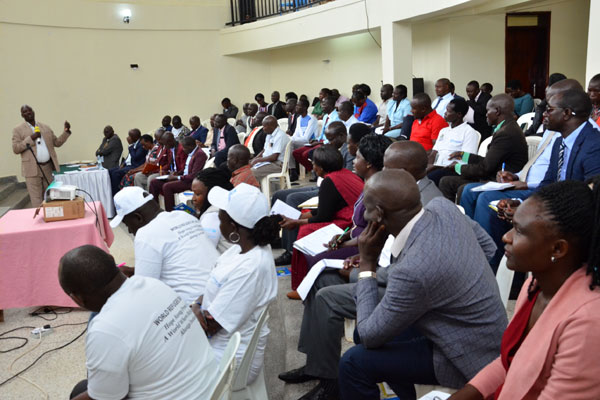West Nile leaders call for extension of donor-funded project

Some of the leaders tour the DRDIP sub-project at Ocoko Primary School in Arua District at the weekend. PHOTO/FELIX WAROM OKELLO
What you need to know:
- The Development Response to Displacement Impact Project (DRDIP) commenced in June 2017.
- The project addresses the unmet social, economic and environmental needs identified in the local host communities in 15 districts, including Arua, Terego, Madi-Okollo, Koboko, Yumbe, Moyo, Obongi, Lamwo, Kiryandongo, Kikuube, Hoima, Isingiro, Kamwenge, and Kyegegwa.
West Nile leaders have asked the government and donors to extend the Development Response to Displacement Impact Project (DRDIP) to enable contractors complete works.
The first phase of DRDIP is scheduled to close at the end of this month.
While meeting in Arua District at the weekend, the leaders said some roads, health centres and schools were still in a sorry state.
“We should work hard with the engineers and contractors to ensure that the projects that are still incomplete are done before the December 31 deadline. This has come with a lot of pressure but we need to ensure quality work and that no money is returned to the treasury of the World Bank,” the Arua District chairperson, Mr Alfred Okuonzi, said.
“If we were left to survive on the dwindling government funds, we would not be able to provide required services. But with funds from DRDIP, we have been able to construct health centres, classroom blocks, and paved roads and protected the environment,” he added.
The district received Shs15b out of which 78 sub-projects were funded. Of those, 50 have been completed while the rest are in progress.
The deputy Resident District Commissioner, Mr Denis Okwai, urged districts to complete all the accountabilities of the projects so that they are in a better position to qualify for the second phase of the project.
Madi Okollo District received Shs24b for 162 sub-projects. A total of 99 projects have been completed, 56 are still in progress and seven have not started.
The DRDIP desk officer for Terego District, Mr Herbert Jurua, said they received Shs31b but some works are still underway. “The construction of the district headquarters is still incomplete and is at roofing level with some additional design. But we hope by December 31, the engineers should have done most of the work,” he said.
The director of DRDIP, Mr Robert Limlim, said advised districts to utilise the money.
“Terego, Obongi and other districts are still lagging behind in some projects, so make sure that work goes on day and night,” Mr Limlim said.
He directed that all the project accounts be closed and funds accounted for.
“Even when the project comes to an end, make sure that the communities continue to sustain them. The functionalities of the classroom blocks, water points and health facilities should continue without disruption,” he said.




